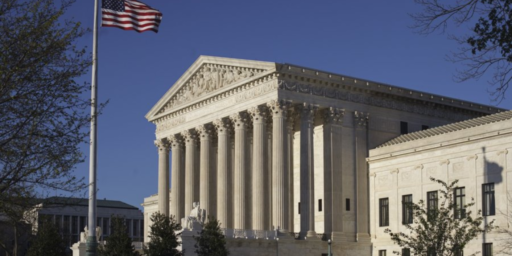Terrorism Show Trial Ends With Near-Complete Acquittal
The first civilian trial of a Guantanamo detainee ends with the Defendant being acquitted on all but one charge, and shows us why the entire process is little more than a show trial.
A man who, up until recently, was being held detained at Guantanamo Bay has been acquitted by a New York jury on all but one charge related to the bombing of two American embassies in Africa twelve years ago:
The first former Guantánamo detainee to be tried in a civilian court was acquitted on Wednesday of all but one of more than 280 charges of conspiracy and murder in the 1998 terrorist bombings of the United States Embassies in Nairobi, Kenya, and Dar es Salaam, Tanzania.
The case has been seen as a test of President Obama’s goal of trying detainees in federal court whenever feasible, and the result seems certain to fuel debate over whether civilian courts are appropriate for trying terrorists.
The defendant, Ahmed Khalfan Ghailani, 36, was convicted of one count of conspiracy to destroy government buildings and property. He was acquitted of four counts of conspiracy, including conspiring to kill Americans and to use weapons of mass destruction.
Because of the unusual circumstances of Mr. Ghailani’s case — after he was captured in Pakistan in 2004, he was held for nearly five years in a so-called black site run by the Central Intelligence Agency and at Guantánamo Bay, Cuba — the prosecution faced significant legal hurdles even getting his case to trial.
On the eve of Mr. Ghailani’s trial last month, the government lost a key ruling that may have seriously damaged its chances of winning convictions.
In the ruling, the judge, Lewis A. Kaplan of Federal District Court in Manhattan, barred prosecutors from using an important witness against Mr. Ghailani because the government had learned about the man through Mr. Ghailani’s interrogation while he was in C.I.A. custody, where his lawyers say he was tortured.
The witness, Hussein Abebe, would have testified that he had sold Mr. Ghailani the TNT used to blow up the embassy in Dar es Salaam, prosecutors told the judge, calling him “a giant witness for the government.”
Without that testimony, there was no evidence to present to the jury tying Ghailani to the actual attacks on the embassy and the deaths of over 200 people. While many commentators seem to be taking this verdict as evidence that Ghailani should have been tried before a military tribunal rather than in a civilian court, there’s a fairly good chance that the outcome would have been the same:
The current rules governing those military tribunals bar the use of torture-obtained evidence to roughly the same extent as real courts do. Anyone who doubts that should simply read Rule 304(a)(1) and (5) of the Military Commissions Manual, found on page 205 of the document:
[304(a)(1)] No statement, obtained by the use of torture, or by cruel, inhuman, or degrading treatment. . . . whether or not under color of law, shall be admissible in a trial by military commission . . . .
[304(a)(5)] Evidence derived from a statement that would be excluded under section (a)(1) of this rule may not be received in evidence against an accused who made the statement if the accused makes a timely motion to suppress or an objection . . . .
The only exceptions to those exclusionary rules are essentially identical to those used in the judicial system, which were applied by Judge Kaplan but found to be inapplicable (“the evidence would have been obtained even if the statement had not been made; or [] use of such evidence would otherwise be consistent with the interests of justice”).
So, even if Ghalani had been tried in a military court as many critics of the Obama Administration’s civilian trial strategy are suggesting, it’s likely that the evidence obtained by torture would have been excluded there as well and that the verdict would have been substantially similar.
Nonetheless, it does seem that the outcome of this trial puts that entire strategy in doubt. If Ghailani can be nearly acquitted because one piece of crucial evidence was obtained via unconstitutional methods, then surely that could also be a possible outcome in a civilian trial of Khalid Sheikh Mohammed, who was waterboarded 183 times while in the custody of the CIA. As Allahpundit notes, there’s simply no way that the Obama Administration, or any President for that matter, is going to take the risk that a high value detainee like KSM would be partially, or fully, acquitted in a civilian court:
The Times piece tries to put a happy face on this for the White House, noting that the court sided with the feds in rulings before the trial that detention at Gitmo didn’t violate Ghailani’s right to a speedy trial and that enhanced interrogation didn’t warrant dismissal of the charges. In theory, that clears the way for trying other terrorists in civilian court. But in practice, it’s purely academic: Ain’t no way, no how, no chance the DOJ will risk an acquittal by bringing another high-ranking terrorist to trial in a district court. They might do it for no-name operatives, where the fallout from a “not guilty” verdict wouldn’t be totally disastrous, but the great national debate about whether to try KSM in a military court or in Manhattan is now well and truly over. In case it wasn’t already.
Indeed. While the odds that there would be any jurisdiction in the United States that would willingly accept a high profile terrorist like KSM, the outcome of the Ghailani case makes it clear that neither Mohammed, nor any other high ranking al Qaeda suspect will ever see the inside of a civilian courtroom. That doesn’t mean, however, that any of them will ever be released:
The judge himself recognized the significance of excluding the witness when he said in his ruling that Mr. Ghailani’s status of “enemy combatant” probably would permit his detention as something akin “to a prisoner of war until hostilities between the United States and Al Qaeda and the Taliban end, even if he were found not guilty.”
As Glenn Greenwald notes, the Obama Administration has already made clear that this is exactly what would happen to Ghailani, and presumably to any other detainee who managed to “beat” the civilian or military justice systems:
But even had he been acquitted on all counts, the Obama administration had made clear that it would simply continue to imprison him anyway under what it claims is the President’s “post-acquittal detention power” — i.e., when an accused Terrorist is wholly acquitted in court, he can still be imprisoned indefinitely by the U.S. Government under the “law of war” even when the factual bases for the claim that he’s an “enemy combatant” (i.e. that he blew up the two embassies) are the same ones underlying the crimes for which he was fully acquitted after a full trial.
(…)
Most news accounts are emphasizing that trying Ghailani in a civilian court was intended by the Obama DOJ to be a “showcase” for how effective trials can be in punishing Terrorists. That’s a commendable goal, and Holder’s decision to try Ghailani in a real court should be defended by anyone who believes in the rule of law and the Constitution. But given these realities, this was more “show trial” than “showcase” since the Government would simply have imprisoned him, likely forever, even if he had been acquitted on all counts.
Greenwald is largely correct here. Whether they are tried in a civilian or a military court, none of the high-level al Qaeda suspects currently in custody are going to be freed at any point in the conceivable future. That makes the entire idea of trying them in any venue little more than a sham, as Jonah Goldberg noted last year:
Every day it appears more and more that the White House wants it both ways. They want to claim that this is a fair trial but also an act of venegeance. The terrorists will be treated as if they might be innocent — key to a fair trial — but at the end of the day they’ll get their comeuppance. If KSM & Co. get off on a technicality, don’t worry, they’ll still be locked up, but when they’re convicted the White House will claim it was always a fair process. They’ll get a fair trial from an impartial jury in New York, but it’s “fitting” and “poetic justice” that the jury will be drawn from the community that was viciously attacked on 9/11. Fair but vengeul, honest but foreordained, instructive to the world but really just about the law: The rhetoric from the White House and the Democrats isn’t persuasive to those who listen closely and certainly won’t be persuasive to foreigners Obama is determined to impress.
The point of all of this is to show that the rule of law is intact, but what the White House is doing is in fact undermining the legitimacy of the legal system by having it do something it shouldn’t. Obama, Pat Leahy, and the rest preen as if they are morally superior for preferring civilian courts, but what they are doing is undermining civilian courts, and it gets worse every time they open their mouths.
I don’t like the idea of indefinitely detaining people without some prospect of judicial review to determine whether or not they there is a legitimate reason to detain them, but I like even less the idea of the justice system being used to “send a signal” when it’s clear that the outcome in Court will have absolutely no impact on whether or not someone continues to be held in detention. That’s not justice, it’s a Stalinist show trial.







I think the main point here is that torture isn’t really a great way to obtain evidence. It’s the torture that makes it impossible for us to now convincingly uphold the rule of law. Which is one of the many things opponents of torture pointed out. Torture and rule of law are mutually exclusive.
By the way, it shows just how depraved conservatives have become in that they seem willing to assume that a military tribunal would accept torture testimony. That is a mortal insult to the US military and its system of justice.
Michael,
That’s certainly one issue, but the show trial aspect of all of this would exist regardless of whether or not torture was an issue
So what’s the solution? Let alleged terrorists go free if they are acquitted, either by military or civilian jury? Don’t bother trying them at all? Summary execution?
Doug,
I felt as though you nailed the substance of the issue. While the left is heralding this as a triumph of our legal system, we are in fact degrading it because the reality was, regardless of the outcome, this detainee was not going to be released. At least Gitmo trials are Gitmo trials. Obama is lucky he squeaked this one through because an aquittal would have been an infinit political desaster at home and abroad.
I also felt the entire substance of the case felt awkward in civilian court. I mean we are trying a man who blew up 200 civilians. That really encompasses a whole new level of crime not yet examined by our criminal law. The mere complications involved in this trial scream to this being the case.
Seriously? Oklahoma City killed 168 and injured another 450. I’m no expert, but I should think US criminal law has Ghailani covered.
I also felt the entire substance of the case felt awkward in civilian court. I mean we are trying a man who blew up 200 civilians. That really encompasses a whole new level of crime not yet examined by our criminal law. The mere complications involved in this trial scream to this being the case.
Really? Tim McVeigh?
An important point though is the one charge that is sticking he is facing 20 years up to life. It’s not like this guy has gotten off scot free. I’d hate to see the lesson being that we should allow torture cause it could yield useful information. Especially if that trickled down to local law enforcement.
Michael and Rob – Really? International military conflict the same as Crazy from Oklahoma? Ok…
Aren’t some child molesters detained even after they have served their full sentences?
Sam:
We were using your terms. You defined the difference as being the murder of 200 civilians and said it was a whole new level of law. It wasn’t. Now you slide over to insinuating we don’t know the difference between foreign and domestic. Nice try, no buy.
ponce.
You’re referring to civil commitment, and that at least requires a judicial proceeding and a finding by a court that the party meets the requirements of the statute.
There’s no opportunity for any kind of judicial review in the endless detention policy we have for Gitmo detainees, and that is a problem
Michael,
I thought I was writing a blog comment, not a contract.
So you agree with my conclusion, but my premise was shoddy? And you want a pat on the back for that? Thank God I didn’t have a spelling error.
Pretty much: International terrorist = Domestic terrorist = Terrorist.
I thought I was writing a blog comment, not a contract.
Translation: It’s not fair for you to respond to the words I actually use. You should respond to what I meant to say.
So you agree with my conclusion, but my premise was shoddy? And you want a pat on the back for that? Thank God I didn’t have a spelling error.
Oh, and by the way, I won’t be telling you what I meant to say.
Mantis,
LOL! I love it! Very clever!
Having reading comprehension will help you with your problem though. Give it a try sometime.
See Rob’s reply if you need an example, he gets it.
How many “Stalinist show trials” ended in acquittals?
Just saying….
I notice no one had any answers to my question:
So what’s the solution? Let alleged terrorists go free if they are acquitted, either by military or civilian jury? Don’t bother trying them at all? Summary execution?
mantis,
Honestly, I don’t know what the answer is. Ideally what I’d like to see is at least some form of judicial review of a decision by the President that someone will be labeled a “terrorist” and held for an indefinite period. I don’t trust any President with the unilateral authority to do that.
Ideally what I’d like to see is at least some form of judicial review of a decision by the President that someone will be labeled a “terrorist” and held for an indefinite period. I don’t trust any President with the unilateral authority to do that.
Me neither, and what you’re proposing might be the least worst solution. So do we bother with trials at all, or just a sort of secret FISA court for approving indefinite detainment? Do we have to wait until hostilities with al Qaeda and the Taliban end to let them go?
I don’t like what the Obama administration has done about all of this, but I honestly can’t think of what alternatives they’ve had.
My objection to civilian trials for guys like Ghailani and KSM boils down to the fact that we know that these guys are never going to be released regardless of what happens. In a real civilian criminal trial, there is always the possibility that a Defendant could be found not guilt and walk out the courthouse door.
Since that will never happen in this case, the entire trial process strikes me as a farce and an insult to the criminal justice system
Yeah. Depressing, really.